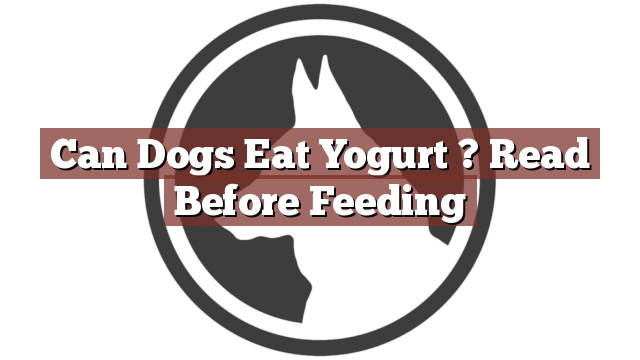Understanding Your Dog’s Dietary Needs
As a responsible pet owner, it is essential to understand your dog’s dietary needs to ensure their overall health and well-being. Dogs are omnivores, meaning they can consume a variety of foods from both plant and animal sources. However, not all human foods are safe for dogs to eat, as some can be toxic or cause digestive issues. It is crucial to educate yourself about what foods are suitable for your furry friend and which ones should be avoided.
Can Dogs Eat Yogurt? Read Before Feeding
Can dogs eat yogurt? This is a common question among dog owners who want to share their favorite treat with their four-legged companions. The answer is yes, dogs can eat yogurt, but there are a few important things to consider before feeding it to your furry friend.
Yogurt is a dairy product that is made by fermenting milk with live bacteria cultures. It is a good source of protein, calcium, and probiotics, which are beneficial for the digestive system. However, not all types of yogurt are safe for dogs. Plain, unsweetened yogurt without any additives or artificial sweeteners is the best option for dogs.
Pros and Cons of Feeding Yogurt to a Dog
Feeding yogurt to your dog can have several benefits. The probiotics found in yogurt can help promote healthy digestion and improve gut health. This is particularly beneficial for dogs that have digestive issues or are on antibiotics, as antibiotics can disrupt the natural balance of bacteria in the gut.
Additionally, yogurt is packed with calcium, which is essential for maintaining strong bones and teeth. It also contains protein, which is necessary for muscle growth and repair. Including yogurt in your dog’s diet can be a healthy and nutritious addition.
However, there are some potential drawbacks to consider as well. Some dogs may be lactose intolerant or have a sensitivity to dairy products. If your dog experiences any digestive issues such as diarrhea or bloating after consuming yogurt, it may be best to avoid feeding it to them. It’s always a good idea to consult with your veterinarian before introducing any new food into your dog’s diet.
Conclusion: Is Yogurt a Safe and Healthy Option for Dogs?
In conclusion, yogurt can be a safe and healthy option for dogs when fed in moderation and under the right circumstances. It is important to choose plain, unsweetened yogurt without any additives or artificial sweeteners. Yogurt can provide various benefits for your dog’s digestive health and can be a good source of calcium and protein.
However, it’s crucial to be aware of your dog’s individual needs and any potential sensitivities or allergies they may have. If you have any concerns or questions about feeding yogurt to your dog, it is always best to consult with your veterinarian. They can provide you with personalized advice and recommendations based on your dog’s specific dietary requirements. By making informed decisions about your dog’s diet, you can help ensure that they maintain optimal health and well-being.
Thank you for taking the time to read through our exploration of [page_title]. As every dog lover knows, our furry friends have unique dietary needs and responses, often varying from one canine to another. This is why it's paramount to approach any changes in their diet with caution and knowledge.
Before introducing any new treats or making alterations to your dog's diet based on our insights, it's crucial to consult with a veterinarian about [page_title]. Their expertise ensures that the choices you make are well-suited to your particular pet's health and well-being.
Even seemingly harmless foods can sometimes lead to allergic reactions or digestive issues, which is why monitoring your dog after introducing any new food item is essential.
The content provided here on [page_title] is crafted with care, thorough research, and a genuine love for dogs. Nevertheless, it serves as a general guideline and should not be considered a substitute for professional veterinary advice.
Always prioritize the expert insights of your veterinarian, and remember that the health and happiness of your furry companion come first.
May your journey with your pet continue to be filled with joy, love, and safe culinary adventures. Happy reading, and even happier snacking for your canine friend!

